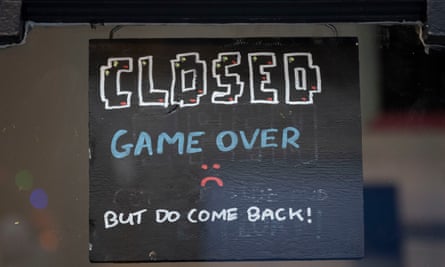Covid help extended for self-employed people, but some miss out
The UK government has pledged £7.3bn in a refreshed package of support for self-employed people. But critics say that almost 3 million workers may be out of pocket, with the second coronavirus lockdown in England, and the Covid-19 restrictions in Scotland, Wales and Northern Ireland leaving many freelancers and contractors out in the cold again.
This week the Treasury presented a revised self-employment income support scheme (SEISS) that will pay out up to a maximum of £7,500 for the three months from November to January, with the first payments made in December.
Under pressure from unions and small businesses, the government has also extended a universal credit allowance that was due to run out in mid-November. That will now continue into April next year.
Announcing the changes, the chancellor, Rishi Sunak, said: “It’s clear the economic effects are much longer lasting for businesses than the duration of any restrictions, which is why we have decided to go further with our support.
“Extending furlough and increasing our support for the self-employed will protect millions of jobs and give people and businesses the certainty they need over what will be a difficult winter.”
However, ExcludedUK, a group that emerged in March to campaign on behalf of those unable to access government support, says much more needs to be done to help the recently self-employed, limited company directors and other groups that do not benefit from the SEISS.
Aron Padley of ExcludedUK says: “Nothing has changed. The eligibility criteria are exactly the same. Seven months on, many people in our group are now in a dark, dark place. Many people have lost everything.”
The coronavirus pandemic has brought tens of thousands of self-employed workers in the UK to the brinkProspect’s Mike Clancy
Padley, who runs a bridal and menswear business in Bournemouth, currently closed because of the coronavirus restrictions, says ministers will not sit down to talk to the group, and people are desperate.
“We are talking about a mass mental health crisis, with 14% of people in our last survey saying they are having suicidal thoughts,” he says. “The government has turned its back on 3 million people who have paid into the system all their lives, who are hard workers, risk takers and employ people. They are in crisis.”
An inquiry set up by the trade unions Prospect and Community has warned that the government risks creating a “stampede” away from self-employment that will damage the economy as well as crushing the entrepreneurial dreams of thousands.
Mike Clancy, Prospect general secretaryProspect’s general secretary, Mike Clancy, who commissioned the inquiry, said: “The coronavirus pandemic has brought tens of thousands of self-employed workers in the UK to the brink. Jobs and livelihoods at risk, and whole sectors such as the creative industries, are facing an uncertain future as their workforce have been left with little or no support from the government.”
How the SEISS works
 View image in fullscreenThe business secretary, Alok Sharma, says the UK government is ‘determined to support’ self-employed workers. Photograph: Tolga Akmen/AFP via Getty Images
View image in fullscreenThe business secretary, Alok Sharma, says the UK government is ‘determined to support’ self-employed workers. Photograph: Tolga Akmen/AFP via Getty Images
The scheme looks at how much a self-employed person was making before the coronavirus crisis and then pays out a proportion of that. It is based on that person’s “trading profits” as disclosed to HMRC in the three years running up to April 2019.
Let’s say you made self-employed profits of £20,000, £23,000 and £29,000 in the three years to April 2019. That is a total of £72,000, or an average of £24,000 a year.
Under the first SEISS, the government grant was calculated at 80% of average monthly profits, in this case £2,000, which meant you would have received £1,600 a month. It was paid in a three-month chunk, working out at £4,800.
The second SEISS grant, also to cover a three-month period, paid up to 70% of earnings. Applications for that grant closed in October.
The latest scheme, which will cover November, December and January, is like the first. It will pay 80% of profits and comes as a single instalment, capped at £7,500. There will be a third grant, to cover January to April, but details are yet to be confirmed.
Who is eligible?
 View image in fullscreenSome businesses have had to temporarily close because of the coronavirus crisis. Photograph: Matthew Horwood/Getty Images
View image in fullscreenSome businesses have had to temporarily close because of the coronavirus crisis. Photograph: Matthew Horwood/Getty Images
First, at least half of your income needs to have come from self-employment. So if you, say, worked four days a week as an employee then freelanced for one day to top up your income, you could not claim the grant.
You also have to have earned a profit of less than £50,000 in 2018-19, or an average trading profit of less than £50,000 in 2016-17, 2017-18 and 2018-19. That cap ruled out about 200,000 people who were making more than £50,000 a year. They get nothing.
The newly self-employed are left out, too, because they don’t have a record of making trading profits. Crucially, so are the estimated 700,000 self-employed people who set themselves up as limited companies.
To qualify you must be actively trading but affected by the Covid-19 pandemic or have been previously trading but be temporarily unable to do so because of the virus.
What is the maximum you can get?
 View image in fullscreenThe maximum is £2,500 a month, or £7,500 for the first three-month period. Photograph: Tek Image/Science Photo Library/Getty
View image in fullscreenThe maximum is £2,500 a month, or £7,500 for the first three-month period. Photograph: Tek Image/Science Photo Library/Getty
As under the first grant, the maximum is £2,500 a month, or £7,500 for the first three-month period.
Bear in mind that the grant has to be declared in your 2020-21 tax return and will be subject to income tax and class 4 national insurance contributions.
When will you receive the money?
The online service to claim the next grant will be available from 30 November 2020. The government is promising a faster turnaround than before, with the first grants expected to be issued in early December.
Other benefits
The Department for Work and Pensions (DWP) was on course to reinstate a mechanism for calculating universal credit payments for the self-employed, known as the minimum income floor. Critics say it cuts payments by assuming people earn a higher figure than they do. But on Tuesday the DWP said the suspension of the minimum income floor will last until April 2021.
In the UK and Ireland, Samaritans can be contacted on 116 123 or email jo@samaritans.org or jo@samaritans.ie. In the US, the National Suicide Prevention Lifeline is 1-800-273-8255. In Australia, the crisis support service Lifeline is 13 11 14. Other international helplines can be found at www.befrienders.org.
‘It has been hideously stressful for us as a family’
 View image in fullscreenLouise Tickle has received no government support because she set herself up as a limited company. Photograph: Fabio De Paola/The Guardian
View image in fullscreenLouise Tickle has received no government support because she set herself up as a limited company. Photograph: Fabio De Paola/The Guardian
Louise Tickle is a self-employed journalist, trainer and public speaker, but although she earns below the £50,000 cap that qualifies self-employed individuals for government support, she has received nothing because she set herself up as a limited company after being advised that was the only way she could get childcare vouchers.
“Setting up as a limited company is not some dodgy tax avoidance scheme,” says Tickle, who has written for the Guardian. “I set up as a limited company eight years ago because at the time, when I had very young kids, it was the only way you could claim childcare vouchers, and I needed that tax relief on enormous childcare bills.”
“To be honest, it was marginal at best to set up as a limited company because I’ve also had to pay £800 in accountancy fees. It’s not as if I’m someone earning above £50,000.”
As a limited company director she is one of 700,000 people excluded from the SEISS, even though her income dried up almost completely when the first lockdown began.
“The journalism, the training, the public speaking, it all nearly completely stopped. I was fortunate to get an emergency grant from a charitable foundation that has helped keep me afloat financially, but without that it would have been a very different story for us. My partner is also self-employed. It has been hideously stressful for us as a family.
“It doesn’t make sense to treat people this way.”
This article was amended on 26 November 2020 to clarify that applications for the second SEISS grant closed in October. An earlier version had stated that the grant ended in October.


